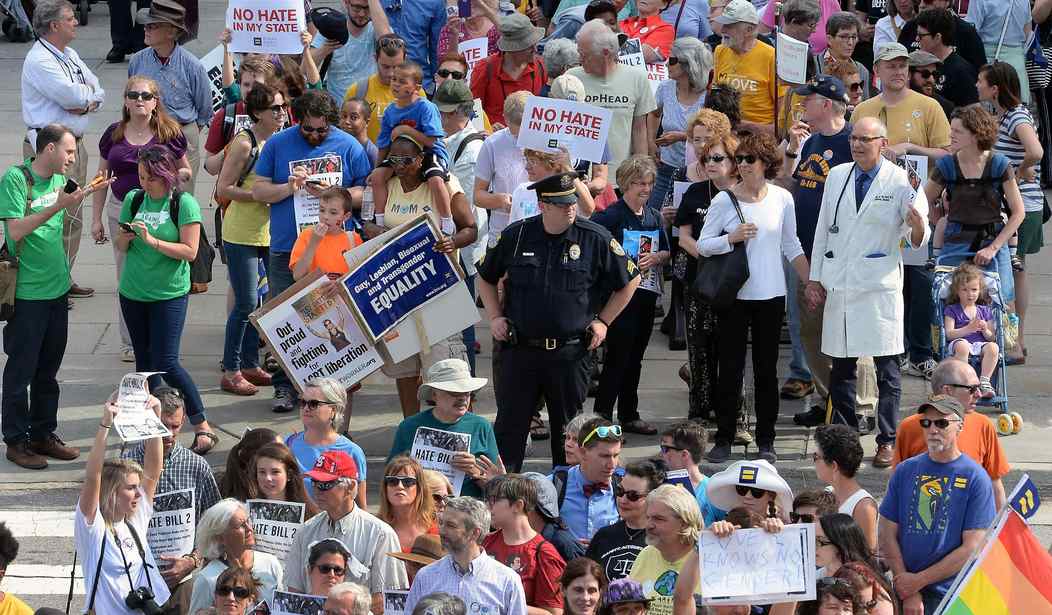Gov. Pat McCrory (R) called it “another classic example of politically correct hypocrisy gone mad” when NBA Commissioner Adam Silver confirmed Aug. 19 the league would rip its 2017 All-Star Game away from Charlotte, N.C., and move it to New Orleans.
“According to his own statements, Commissioner Silver has no credibility in telling America that he’s more ‘comfortable’ playing a basketball game in the People’s Republic of China with its oppressive human rights record, rather than the 9th most populous state in the USA,” said McCrory through his communications director, Josh Ellis.
Silver announced in July that the NBA would move that game out of North Carolina because of the state’s transgender bathroom law, known as HB2.
So the fact that the All-Star competition’s location would be someplace other than Charlotte, N.C., wasn’t news.
But the announcement that it would go to New Orleans only served to light a new fire under one of the hottest campaign issues in the North Carolina gubernatorial election, which pits McCrory against Roy Cooper, the state’s attorney general.
Gov. McCrory and Attorney General Cooper (D) are as much in disagreement over the HB2 transgendered bathroom legislation as any Republican and Democrat could be.
Adding to the disharmony is the fact that Cooper wants McCrory’s job. And the latest polls show the Democrat just might be able to knock off the Republican incumbent in November.
McCrory has refused to back away from HB2, a stance that Family Research Council president Tony Perkins applauded shortly after Silver announced the NBA 2017 All-Star Game would go to New Orleans.
“I commend North Carolina Governor McCrory for his political courage and moral clarity in not caving into the NBA’s threats to move the All-Star game,” Perkins said. “He stared down the giant of the NBA and stood strong against government discrimination of private entities and for the principles of protecting privacy and safety in government buildings.”
McCrory told the Courier-Tribune in July that he and North Carolina legislative leaders had a “total verbal agreement with the NBA” to keep the 2017 All-Star Game in Charlotte.
Unnamed sources told the newspaper that to say there was a deal in place was an overstatement.
However, McCrory stated that they had an agreement, and it was “sabotaged” by unnamed Republican legislative leaders. He also blamed Cooper and the Human Rights Campaign for pushing the legislature to repeal HB2 instead of compromising on changes to the bill.
A Cooper campaign spokesman told the Courier-Tribune that charge was “absurd.”
Still, the same day Silver announced the NBA’s New Orleans decision, the Human Rights Campaign and Equality NC endorsed Cooper’s campaign to unseat McCrory.
“As governor, Roy Cooper will work to repeal HB2, stand up for common decency and fight to pass statewide, LGBTQ-inclusive, non-discrimination protections. The choice this election couldn’t be clearer,” said Human Rights Campaign president Chad Griffin.
North Carolina’s transgender bathroom law, HB 2, is an emotional issue for both conservatives and progressives in the state. It has been called by some the most anti-LGBT legislation in the nation because part of the bill allows people to only use the public bathroom that matches the gender they were assigned at birth, not the gender they may have chosen. But it has been Cooper’s refusal to defend the state’s voter ID law that sparked a blue flame of outrage from the McCrory camp.
Cooper said going back to court to appeal a ruling in which three federal judges found the law targets “African-Americans with almost surgical precision” would be a lost cause.
McCrory accused Cooper of refusing to do his job as North Carolina’s attorney general.
“We’re very disappointed to hear that again his office is not willing to do his job,” McCrory said. “In fact, I question whether he should even accept a paycheck from the state of North Carolina anymore because he continues to not do his job, as his oath of office requires him to do.”
Cooper pushed back, telling reporters the problem with the law is that it is unconstitutional. Cooper said he warned McCrory and others, but they ignored his best advice.
“I told the legislature it was a bad idea,” Cooper said. “I told the governor that he should veto it. We defended it for three years anyway but have gotten to the point now, with this unanimous 4th Circuit opinion, that it’s time to stop.”
McCrory has vowed to defend the voter ID law with or without Cooper’s help and has done his best to make it a campaign issue.
However, the bigger issue here could be that Cooper has refused to appeal the court’s decision.
Taylor Batten, editorial page editor of the Charlotte Observer, wrote that charging Cooper with failing to do his duty might be the issue that saves McCrory’s reflection campaign.
And McCrory needs help.
So far nothing, whether it was the HB2 debate, or Cooper’s refusal to defend the state’s voter ID law or even a charge that Cooper was nothing but a lifelong politician, has been enough to propel McCrory to a sustainable lead among voters.
In fact, two polls released in August show Cooper leading the incumbent. A Public Policy Polling survey has Cooper in the lead by a point, which is within the margin of error.
But an NBC/Wall Street Journal/Marist poll released a few days later showed Cooper with a seven-point lead.
“If McCrory is to stop his slide in the polls – from up 5 in June to tied to down 7 in one poll last week,” wrote Batten, “he’ll need something a little stickier for Cooper’s wall.”









Join the conversation as a VIP Member